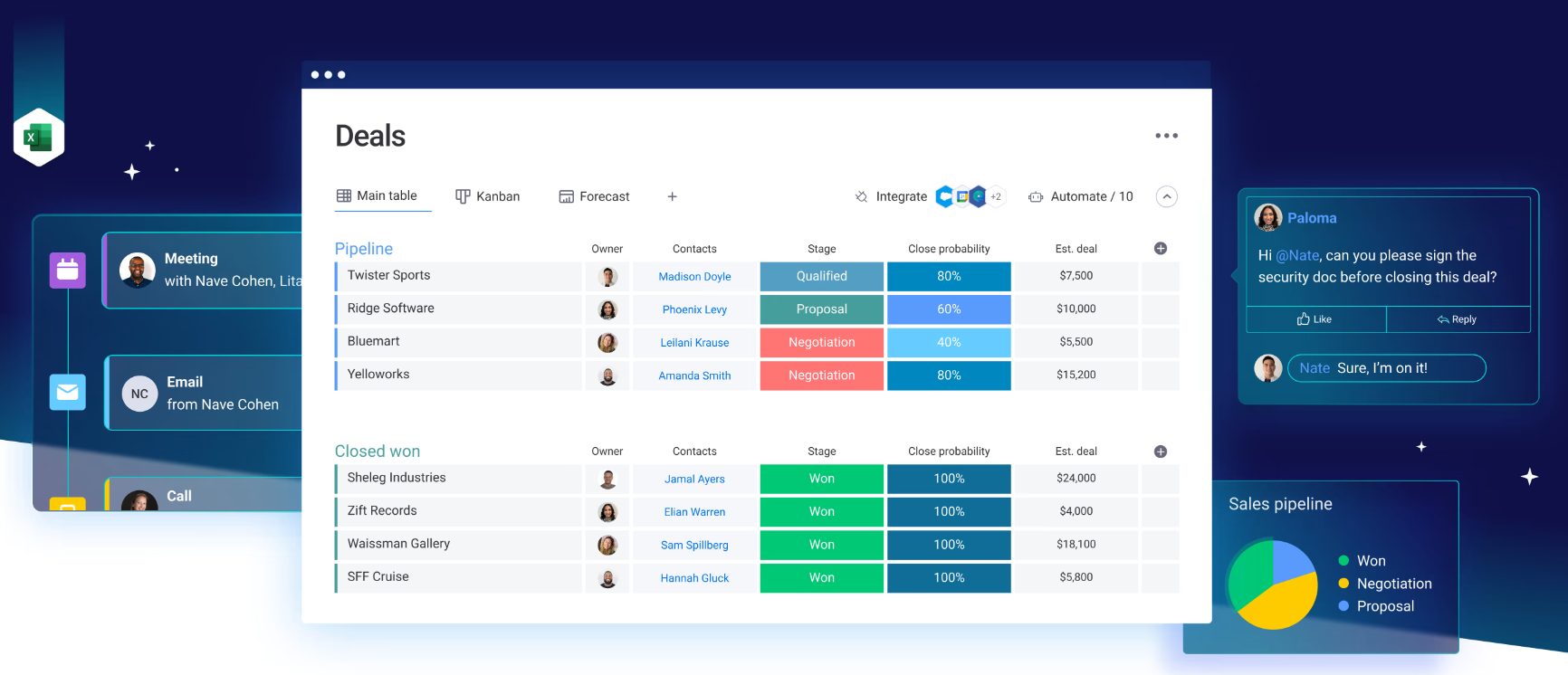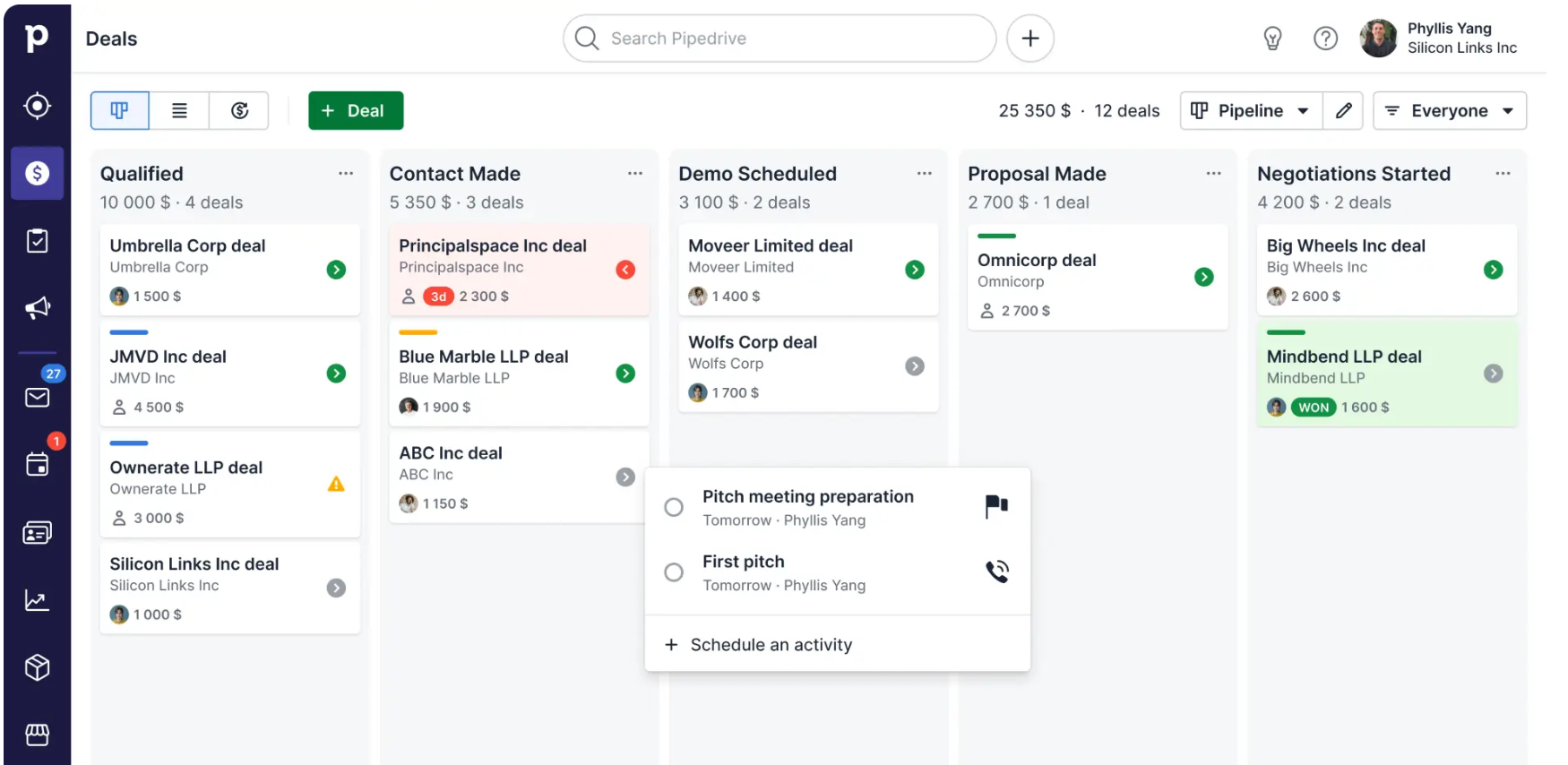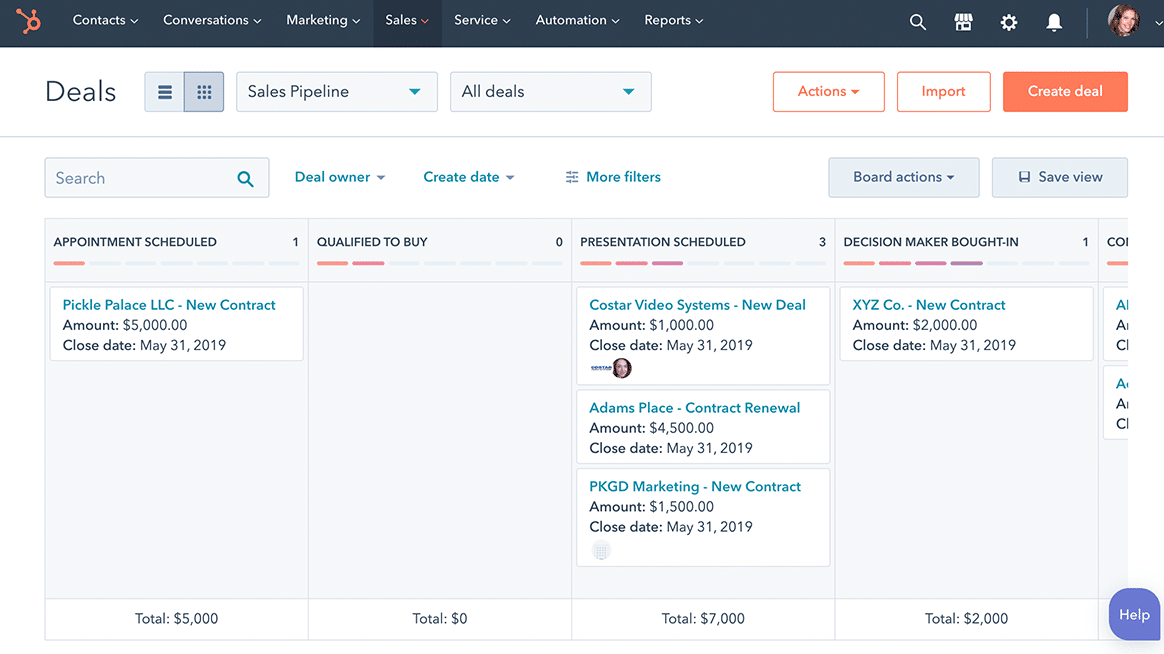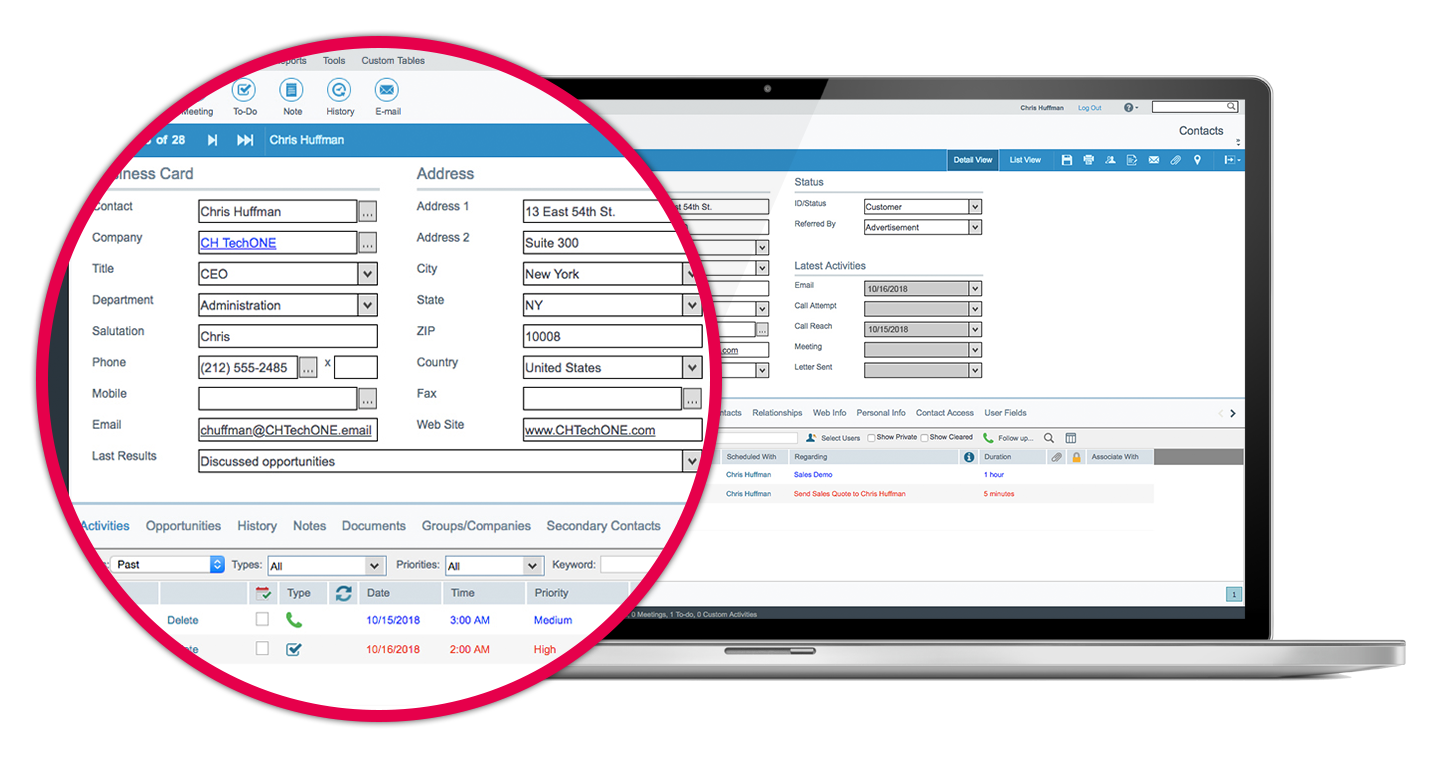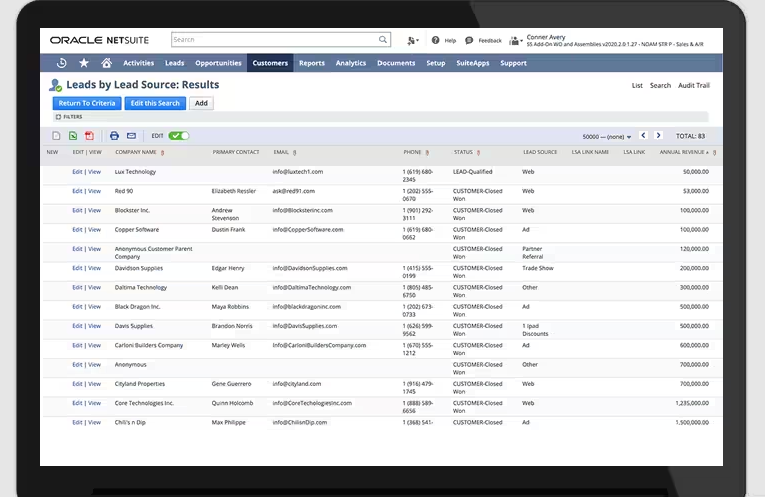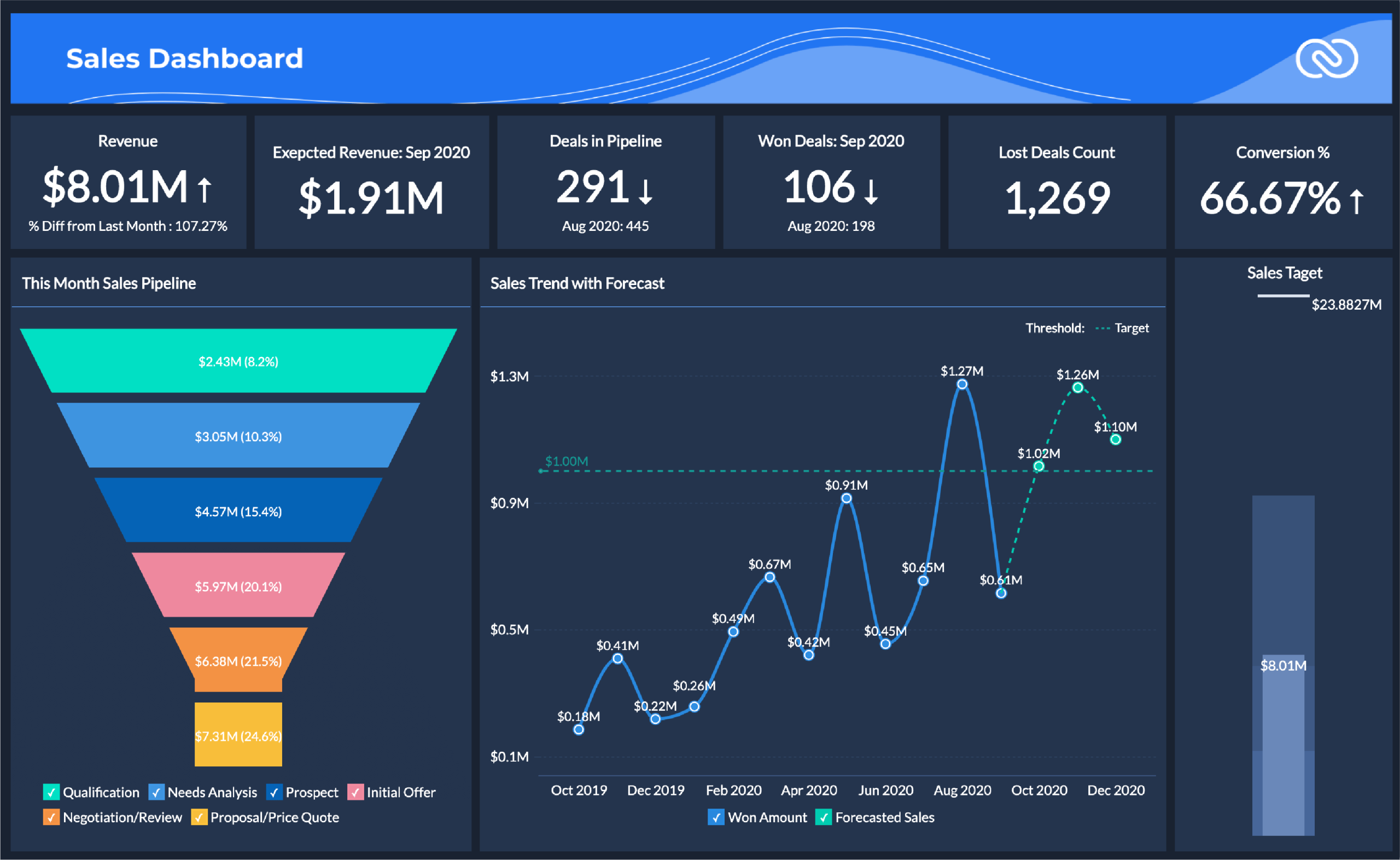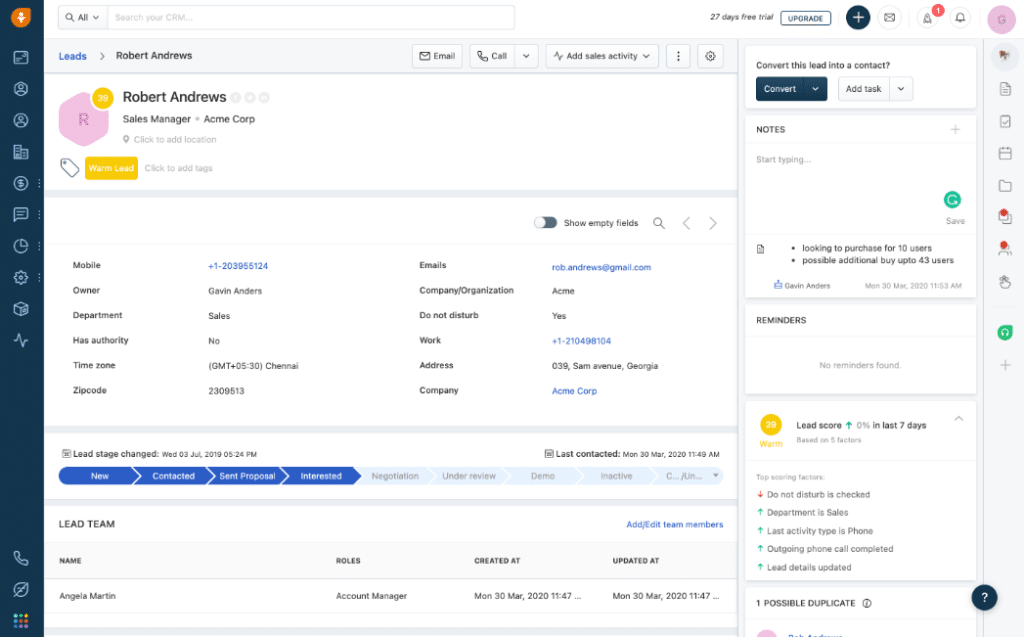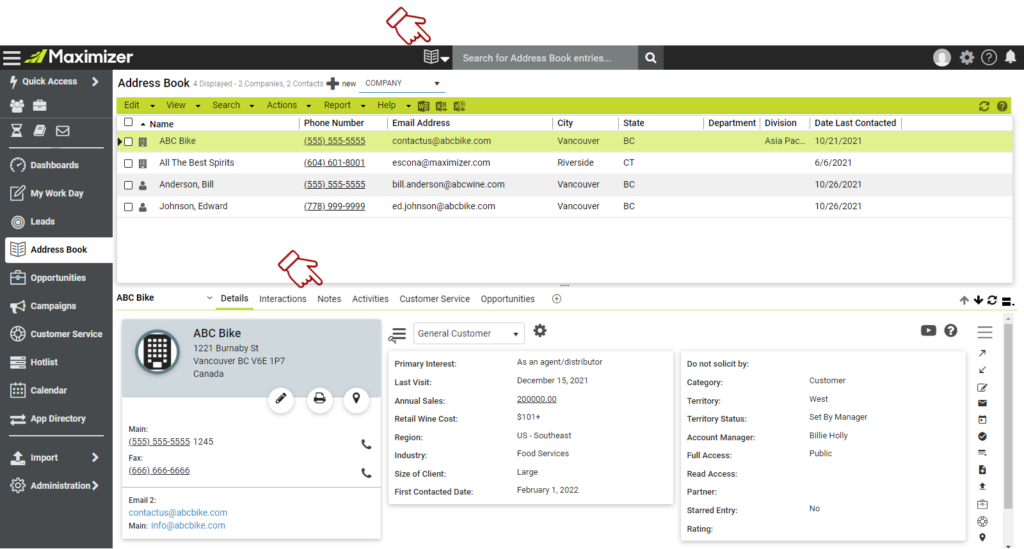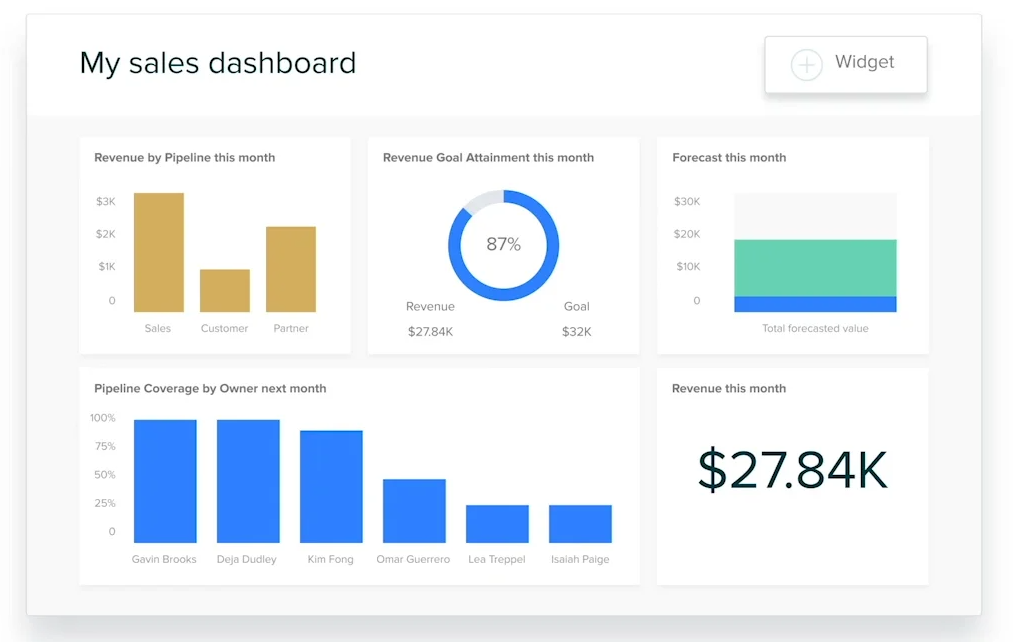The best CRM software has the potential to completely transform the way you handle customer and prospect data and way you do business. With the right CRM tools at your disposal, you can centralize all customer data, streamline business communications, enhance productivity, shorten your sales cycle, and ultimately improve your bottom line.
In this guide, we’ve reviewed the best customer relationship management solutions, looking at their features, ease of use, and pros and cons to help you make an informed decision and choose the best CRM software for your organization.
The Market’s Best CRM Software Ranked
Based on our thorough research, here’s our list of the top 10 CRMs for 2023 – with Monday.com coming out on top as the best overall solution:
- Monday Sales CRM — Rated as the best CRM overall and can be precisely tailored to your processes and sales cycle.
- Salesforce — Industry-leading solution that is fully customizable and comes with workflow automation, advanced activity tracking, and seamless file sharing.
- Pipedrive — A simple, Kanban-based product that has built-in performance tracking and pipeline management.
- HubSpot Sales Hub — A powerful platform with a free plan and comprehensive tools for email, call, and performance tracking.
- Act! — Great solution for small business, with advanced email marketing automation options and granular sales pipeline management.
- Oracle NetSuite — Robust CRM with excellent partner relationship management features and collaboration tools.
- Zoho CRM — A powerful, omnichannel communication platform, which is great for large companies and which comes with features for driving customer interactions and sales.
- Freshsales — An easy-to-use CRM tool that is perfect for companies building a lead generation machine.
- Maximizer — Lead and opportunity management software designed for sales leaders to monitor performance and optimize sales processes.
- Zendesk Sell — An intuitive sales package intended to help boost sales team productivity and drive excellent customer service using data.
What is a CRM?
Customer relationship management (CRM) software is a cloud-based or on-premise application that allows you to collect relevant prospect and customer data, visualize and streamline your sales process, automate your marketing efforts, and close sales more reliably.
Indeed, having an effective CRM in place can be key to scaling your business, unlocking efficiencies so you can bring your product to market faster and more effectively.
That said, client management software solutions do much more than simply facilitate communication with existing and potential customers. If you want to learn more about CRMs, read our in-depth CRM guide.
Top Software CRMs Reviewed
A CRM system is a long-term investment, and it’s a purchase you shouldn’t make lightly. If you implement a CRM that lacks crucial features that you need, you’re essentially throwing time and money down the drain. Equally, if you sign up for a feature-rich software CRM where most of the functionality is unused, you’re probably overpaying for the product.
To help you make an intelligent, informed decision, here are our in-depth reviews of the most popular CRM solutions on the market. This will help you understand exactly what different providers offer and accurately gauge how well each CRM would align with the needs of your business.
1. Monday Sales CRM — Best CRM Overall
Monday Sales CRM is a simple, easy-to-use CRM solution for teams of all sizes. Its drag-and-drop UI ensures that it’s intuitive and simple to get started, and there are extensive options to customize the platform according to your own needs and organizational processes.
Monday can serve as a central contact manager software suite for your customer data, allowing you to unify all customer communications. It automatically logs all emails and keeps track of conversations across all your communication channels.
| Best For | Price | Free Version/Free Trial | Mobile Support |
| Lead management, task and project tracking, and sales automation | From $10/seat/month | 14-day free trial | iOS and Android |
Another key feature of Monday Sales CRM is sales automation. You can use a simple visual editor to set up triggers for different actions and automatically assign leads to sales reps, set reminders for upcoming tasks, meetings, and activities, and get instantly notified when a lead opens a marketing email. These are just some of the great features of the CRM software Monday offers. It’s also worth checking out Monday’s powerful project management product.
Key Features
- Email sync — You can fully sync your Gmail or Outlook business inbox with Monday to send and receive all emails within the app, as well as automatically logging all email conversations
- Activity management — Monday Sales CRM logs every lead-related activity, including calls, meetings, and notes, letting any sales rep pick up where their coworkers left off since they have all the information on every lead at their fingertips
- Performance tracking — You can use CRM system Monday to set team goals, generate in-depth reports with estimates vs. actuals, and monitor the performance of teams and individual sales agents
- No-code automations — Use pre-built automations or create your own in seconds using a drag-and-drop interface and save a ton of valuable time
Pricing
Monday Sales CRM offers several pricing plans to choose from:
- Basic — $10/seat/month, minimum of 3 seats – unlimited pipelines, contacts, boards, unlimited free viewers, iOS and Android app
- Standard — $14/seat/month – Basic + email integration, activity management, quotes, and invoices, up to 250 custom CRM automations
- Pro — $24/seat/month – Standard + sales forecasting, email tracking and automations, sales analytics, 25,000 automations, integrations
- Enterprise — Custom quote – Pro + lead scoring, team goals, advanced analytics, GRC, HIPAA compliance, multi-level permissions
Pros
- Intuitive and easy to use
- Syncs with your Gmail/Outlook inbox
- Offers advanced automations without any coding
- Provides real-time notifications of employee activities
Cons
- Few social media integrations
- Lead scoring is only available on the Enterprise plan
2. Salesforce — Fully Customizable CRM With Advanced Activity Tracking and Seamless File Sharing
Salesforce is one of the most popular sales CRM solutions out there. The platform offers a 360-degree view of your customers, facilitates team communication, and helps improve productivity across the entire organization.
Salesforce Sales Cloud provides all of your team members with key information on every lead and customer, making it easy to share data between marketing and sales departments.
| Best For | Price | Free Version/Free Trial | Mobile Support |
| Data centralization, email marketing automation, and lead activity tracking | From $25/user/month | 30-day free trial | iOS and Android |
The platform also features AI-driven prompts, letting your sales reps know when it’s best to engage different leads and helping them formulate convincing and engaging messages that help reliably convert leads into paying customers.
Key Features
- Account and contact management — The CRM Salesforce provides you with all the information you need on every customer, lead, and prospect, and you can also review their full activity history and see every interaction they had with your business
- Sales performance management — You can set team-based goals as well as individual KPIs and monitor the performance of each individual sales agent, and you can create commission-based incentive programs to help boost productivity
- Workflow automation — You can automate business processes using an intuitive drag-and-drop tool in Salesforce, including in approval processes, sales discounts, marketing automations, and real-time notifications
- File sync and sharing — File sync feature enables easy collaboration between multiple team members who can share files, request updates, leave comments, and access all the information they need in real-time
Pricing
These are Salesforce’s pricing plans:
- Starter — $25/user/month – account, contact, lead, and opportunity management, process automation, Gmail/Outlook integration
- Professional — $75/user/month – Starter + pipeline and forecast management, quotes, and invoicing
- Enterprise — $150/user/month – Professional + advanced reporting features and unlimited process automation
- Unlimited — $300/user/month – access to all features + advanced sales insights
Pros
- Fully customizable with the ability to add/remove features
- Easy cross-department information sharing
- Personalized email marketing campaigns
- Advanced activity tracking with real-time notifications
Cons
- Expensive
- It has a steep learning curve
3. Pipedrive — Simple CRM With Kanban Boards and Built-in Performance Tracking
Pipedrive is a relatively simple CRM tool and is ideal for smaller organizations that are using a dedicated CRM for the first time.
The Kanban boards you can create with Pipedrive are minimalistic, so there’s no visual clutter, and you can tell exactly what everyone’s working on at a glance.
| Best For | Price | Free Version/Free Trial | Mobile Support |
| Kanban boards, performance monitoring, real-time reporting | From $14.90/user/month | 14-day free trial | iOS and Android |
It lets you see your average conversion rate, the number of new leads in your pipeline, average time-to-sale, and other key performance indicators. The real-time reports clearly show you areas of improvement and allow you to course-correct if necessary.
Key Features
- Pipeline management — With Pipedrive, you can create and fully customize as many pipelines as you need with no limitations, tailoring the customer journey to your requirements, and you can leverage Pipedrive’s statistics tool to extract key data in seconds and make informed business decisions
- Email sync and tracking — You’ll have access to your business inbox straight from Pipedrive’s dashboard – every email conversation is automatically tracked, and you can group emails, schedule them, and leverage ready-made email templates
- Sales automations — Use simple drag-and-drop UI to create advanced automations, eliminate repetitive tasks, and set up real-time notifications.
- Integrations — You can utilize Pipedrive’s Open API to connect your entire software stack with Pipedrive and have easy access to all the information you need in one place
Pricing
Here are Pipedrive’s pricing plans:
- Essential — $14.90/user/month – Lead, Deal, Calendar, and Pipeline management, data import, and 300+ integrations
- Advanced — $24.90/user/month – Essential + email sync, email grouping, and templates
- Professional — $49.90/user/month – Advanced + revenue projections, forecasts, and custom reporting
- Enterprise — $99.90/user/month – Professional + advanced user permissions, security, implementation program, and priority phone support
Pros
- Simple and easy to use
- Free 14-day trial with no credit card required
- Drag-and-drop automations
- Automatic progress tracking
Cons
- Some plans are expensive
4. HubSpot Sales Hub — Best Free CRM Software
HubSpot Sales Hub is a powerful sales CRM that allows organizations to centralize all their tools and data in one platform.
The best part about Sales Hub is that you can get started for free with contact management, the deal pipeline, scheduling, and reporting, so you can see first-hand if it’s the right fit for your organization before committing.
| Best For | Price | Free Version/Free Trial | Mobile Support |
| Sales automation, email marketing, team collaboration | From $45/month | Free forever plan | iOS and Android |
To help improve your conversion rates, Sales Hub offers professionally made email templates and AI-powered insights that help your sales reps personalize communication and engage leads and prospects in a meaningful way.
Key Features
- Email tracking — Your sales reps will know the second a lead opens an email or clicks a link, and they can then leverage templates and AI-powered conversational intelligence to follow up and drive the sale
- Sales automation — Set up automated emails and follow-up tasks for every team member to ensure everyone knows exactly what steps to take
- Document management and sharing — Build a library of sales content, share it with your team members and track each document to see exactly what content closes the most sales
Pricing
Here are Sales Hub’s pricing plans:
- Free — Free forever, no credit card required – Contact management, deal pipeline, quotes, meeting scheduling
- Starter — From $45/month – Simple automation, goal-setting, conversation routing, productivity performance
- Professional — From $450/month – Starter + advanced automations, email sequences, custom reporting, phone support
- Enterprise — From $1,200/month – Professional + custom objects, predictive lead scoring, playbooks, forecasting, recurring revenue tracking
Pros
- Sales rep productivity tracking and activity sorting
- Professionally designed email templates
- Call tracking and automatic call logs
- Engagement and current lead status tracking
Cons
- No automations on the free plan
- Expensive paid plans
5. Act! — Best CRM Software for Small Business
Act! is a CRM and marketing automation platform designed for small and medium-sized businesses.
Act!’s UI is simple enough that anyone can utilize the full capabilities of the app without any prior CRM knowledge, making it one of the best CRMs for small business and a good solution for those looking for real estate CRM software.
| Best For | Price | Free Version/Free Trial | Mobile Support |
| Email marketing automation, audience segmentation | From $37.50/user/month | 14-day free trial | iOS and Android |
When it comes to email marketing, Act! gives you access to professional email templates, advanced automations, A/B testing, lead scoring, and real-time performance metrics. You can even develop and connect high-converting landing pages and web forms with Act! to ensure every new lead you capture automatically enters into your email sequence.
Key Features
- Relationship history — Every interaction between your business and a lead, prospect, or existing customer is recorded – your sales reps can easily access comprehensive customer profiles to craft personalized messages that drive sales
- Sales pipeline management — You can assess your sales pipeline by product, territory, region, sales agent, and sales stage, helping you identify opportunities and areas for improvement and giving you actionable insights necessary for streamlining sales processes
- Marketing automation — Create and connect powerful landing pages with Act!, create personalized email campaigns with professional templates, and monitor key metrics (e.g., open rate and click-through rate) in real-time
Pricing
Here are Act!’s pricing plans:
- Act! Premium Desktop — $37.50/user/month – Marketing automation, account management, activity tracking, dynamic sales pipeline management, mobile app, integrations
- Act! Premium Cloud — $30/user/month – Everything in Desktop + browser access, automatic updates, disaster recovery, 6Gb of online storage
Pros
- Easy email marketing automations
- Professionally made email templates
- A/B testing and real-time email performance metrics
- Best CRM software for small business
Cons
- Relatively expensive
- No Kanban Boards
6. Oracle NetSuite — Robust CRM Platform With Excellent Partner Relationship Management Features
Oracle NetSuite CRM is a robust CRM platform, perfect for enterprises that work with several partners and startups that outsource sales, marketing, customer support, copy, or design.
NetSuite CRM helps organizations supercharge their sales performance. In addition to providing your sales agents with comprehensive information on every lead and prospect, the platform features integrated processes for quotes, opportunities, sales forecasting, order management, fulfillment, commission, and upsells.
| Best For | Price | Free Version/Free Trial | Mobile Support |
| Marketing automation, remote collaboration, partner relationship management | Custom quote | Free product tour (demo) | iOS and Android |
That said, what makes NetSuite CRM stand out from others on our list are its partner relationship management features. The platform allows for easy information sharing between partners, freelancers, and contractors, lets you execute joint marketing campaigns, and facilitates time-tracking, order processing, and partner commissions and royalties.
Key Features
- Sales Force automation — Automate every aspect of your sales process and provide your sales reps with all the key information they need to close the deal
- Marketing automation — Set up advanced targeting, develop powerful, personalized marketing messages, and reliably convert sales leads into long-term customers
- Partner relationship management — Facilitate work with partners, freelancers, and contractors. Share documents and information, collaborate on projects, and track everything to ensure everyone gets paid the correct sum upon project completion.
Pricing
Oracle NetSuite doesn’t divulge the price of its CRM. You have to contact the company’s sales department to receive a custom CRM software quote.
Pros
- Simple and intuitive UI
- Excellent mobile app
- Powerful reporting and analytics
- Lets you build an online knowledge base for your customers
Cons
- No pricing information is publicly available
- No timeline and calendar views of Kanban boards
7. Zoho CRM — Best for Large Enterprises and International Companies
Zoho CRM is the most complex CRM solution on our list, ideal for organizations that want to transition from their current CRM to a more robust platform.
With Zoho CRM, you can streamline virtually any aspect of your business, from sales force automation and process management to team collaboration, marketing initiatives, and analytics.
| Best For | Price | Free Version/Free Trial | Mobile Support |
| Sales Force Automation, process management, sales forecasting | From $14/user/month | 15-day free trial | iOS and Android |
All customer interactions are automatically logged, so sales reps and customer support agents always have easy access to every message exchanged between a lead, prospect, or customer and your business.
Another functionality of Zoho CRM that we want to highlight is enhancing sales enablement. You can leverage the platform to develop client portals, track all orders and shipment statuses, generate auto-populated invoices, monitor stock, track expenses, and coordinate with partners and suppliers.
Key Features
- Process management — Visually design your sales processes with blueprints, develop scoring, assignment, and escalation rules, and set up clearly defined review processes
- AI sales forecasting — Leverage a personalized AI assistant to identify the status of every deal, determine the best time to contact, assign sales reps based on prediction score, and more
- Marketing automation — Segment your audience, nurture your leads, and develop high-converting marketing campaigns. Leverage marketing attribution to see how each of your marketing channels performs and identify areas for improvement
- Powerful analytics — Set KPIs and monitor business performance and sales cycles in real-time. Generate in-depth reports and create useful charts to make data-backed business decisions
Pricing
Here are Zoho CRM’s annual pricing plans:
- Standard — $14/user/month – workflow automation, scoring rules, sales forecasting, email templates, reporting, and analytics
- Professional — $23/user/month – Standard + real-time notifications, blueprints, webhooks, customer reports, and dashboards
- Enterprise — $40/user/month – Professional + customer portals, full product customization, anomaly detection, web form analytics, channel attribution, audience segmentation
- Ultimate — $52/user/month – Enterprise + Zoho Analytics
Pros
- Robust, highly customizable CRM platform
- AI-powered sales forecasting and predictive lead scoring
- Advanced security and compliance
- Canvas Design Studio that lets you fully redesign your CRM
Cons
- The sheer number of features can be overwhelming
- Requires previous CRM knowledge to fully utilize
8. Freshsales — Easy CRM for Companies Building A Lead Generation Machine
Freshsales is primarily a piece of lead and contact management software that offers a variety of features that help you move sales leads through your sales funnel more efficiently and close deals more reliably.
Freshsales is a great option for newer businesses that want to capture more leads through landing pages, web forms, and live chat.
| Best For | Price | Free Version/Free Trial | Mobile Support |
| Lead management, AI-powered predictive scoring | From $15/user/month | 21-day free trial | iOS and Android |
Another key feature of Freshsales is auto-assignment. You can configure assignment rules and have the platform automatically assign new leads to the most appropriate sales rep.
Key Features
- Lead generation — Create landing pages, develop website forms, and set up a chatbot for your website to reliably convert website visitors into qualified leads
- Auto-enrichment — Lead and prospect profiles are auto-filled using their publicly available data
- Predictive scoring — AI-powered lead scoring based on their interactions with your business and level of interest
Pricing
Here are Freshsales’ pricing plans:
- Growth — $15/user/month – contact, account, and deal management, AI-powered lead scoring, up to 2,000 chatbot sessions per month
- Pro — $39/user/month – Growth + multiple sales pipelines, time-based workflows, sales team, and territory management, up to 3,000 chatbot sessions
- Enterprise — $69/user/month – Pro + custom modules, AI-based sales forecasting, audit logs, up to 5,000 chatbot sessions
Pros
- Simple and easy to use
- Task reminders and follow-ups for your sales team
- Easy to sync with your calendar
- Seamless data entry
Cons
- Lacks marketing automation features
9. Maximizer — Lead and Opportunity Management Software Designed for Sales Leaders
Maximizer is a CRM designed specifically for sales leaders, with features that enable them to effectively coach sales reps, monitor their performance, and establish processes and best practices that ultimately lead to more sales.
Where Maximizer truly shines is by helping you uncover sales opportunities. After honing in on sales-qualified leads, you can set up the exact steps a sales agent needs to take to close the deal. This can include writing emails, scheduling calls, preparing presentations, drafting proposals, finalizing a contract, and everything in between.
| Best For | Price | Free Version/Free Trial | Mobile Support |
| Sales coaching, performance tracking, sales process optimization | From $55/user/month | Demo | iOS and Android |
Maximizer also functions as a customer service platform. It automatically logs all support tickets, complaints, and refund requests and alerts you with real-time notifications so your customer service department can promptly resolve the issue and retain the customer.
Key Features
- Performance monitoring — Easily monitor the performance of every individual sales agent and get instant feedback on your sales coaching
- Sales process optimization — Clearly define sales processes and ensure every agent follows the best practices and employs proven-to-work sales strategies
- Customer success — Leverage customer health analytics and proactively reach out to “at-risk” customers to improve retention and maximize recurring revenue
Pricing
Here are Maximizer’s pricing plans:
- Base Edition — $55/user/month – sales pipeline management, lead and opportunity management, 100Gb online storage, reporting, and analytics
- Sales Leader Edition — $75/user/month – Base Edition + sales coaching and performance monitoring
Pros
- Facilitates sales coaching
- Makes it easy to monitor individual performance
- Lets you clearly define every step of your sales process
Cons
- Dated interface
- No marketing automation
10. Zendesk Sell — Straightforward Sales CRM Software
Zendesk Sell helps organizations gain and maintain full pipeline visibility, define every step of the sales process, boost team productivity, and deliver excellent customer experience.
With Zendesk Sell, you’ll be able to easily capture all the relevant data on your leads that will help sales reps craft personalized messages and adjust their approach to each individual prospect in order to close more sales.
| Best For | Price | Free Version/Free Trial | Mobile Support |
| Sales pipeline management, email follow-ups, sales calls | From $19/user/month | 14-day free trial | iOS and Android |
Your sales department will also have access to a power dialer so that they can get in touch with qualified leads in seconds. Every call is recorded, and your agents will have quick and easy access to sales scripts, complete prospect profiles, notes, and even call analytics, all of which will help them reliably close more deals.
Key Features
- Email sync and tracking — Sync your business inbox with Zendesk Sell and automatically log and track all email conversations. Leverage templates and set up real-time alerts so your agents are notified the instant a lead opens an email
- Call recording and scripts — Help your sales agents close mode deals with phone scripts. Automatically record every call and discover the best sales coaching opportunities
- Smart lists — Segment your leads and deals in real-time and personalize your marketing messages
Pricing
Here are Zendesk Sell’s pricing plans:
- Sell Team — $19/user/month – up to two customizable sales pipelines, email and calendar integrations, task and appointment setting, pre-built sales dashboards
- Sell Growth — $49/user/month – Sell Team + up to 10 sales pipelines, call tracking and recording, custom sales reports, sales forecasting, and goals tracking
- Sell Professional — $99/user/month – Sell Growth + up to 20 sales pipelines, lead and deal scoring, task automation, permission-based access
Pros
- Pipeline management and pipeline visibility
- Built-in telephone system with a power dialer
- Email templates and phone sales scripts
- Real-time push notifications
- Easy CRM to learn
Cons
- No built-in marketing automation
- Steep learning curve
The Best CRM Tools Compared
Here’s a side-by-side comparison of the best CRM tools for 2023 to provide a better overview of what different solutions offer and how much value for money they provide in each case. What’s the top CRM software for you?
| CRM | Best For | Price | Free Version/Free Trial | Mobile Support |
| Monday Sales CRM | Lead management, task and project tracking, and sales automation | From $10/seat/month | 14-day free trial | iOS and Android |
| Salesforce | Data centralization, email marketing automation, and lead activity tracking | From $25/user/month | 30-day free trial | iOS and Android |
| Pipedrive | Kanban boards, performance monitoring, real-time reporting | From $14.90/user/month | 14-day free trial | iOS and Android |
| HubSpot Sales Hub | Sales automation, email marketing, team collaboration | From $45/month | Free forever plan | iOS and Android |
| Act! | Email marketing automation, audience segmentation | From $37.50/user/month | 14-day free trial | iOS and Android |
| Oracle NetSuite | Marketing automation, remote collaboration, partner relationship management | Custom quote | Free product tour (demo) | iOS and Android |
| Zoho CRM | Sales Force Automation, process management, sales forecasting | From $14/user/month | 15-day free trial | iOS and Android |
| Freshsales | Lead management, AI-powered predictive scoring | From $15/user/month | 21-day free trial | iOS and Android |
| Maximizer | Sales coaching, performance tracking, sales process optimization | From $55/user/month | Demo | iOS and Android |
| Zendesk Sell | Sales pipeline management, email follow-ups, sales calls | From $19/user/month | 14-day free trial | iOS and Android |
Why You Need a CRM System
If you don’t have a CRM system in place, you’re working with a limited set of information. If you’re working with a small number of clients and only a handful of team members, you may be able to get by with spreadsheets, calendars, and manual records. However, as you scale, you’ll be working in the dark, making decisions based on rough estimates and your gut feeling.
Having all the data you need at your fingertips and clearly defining your sales processes means you can start to make business decisions with confidence, focus on leads that are most likely to convert, and ultimately generate a lot more revenue. What’s more, automating sales processes and driving marketing automation at scale can make your business enormously more efficient.
There are many areas of your business that a good CRM can help you optimize. Some of these include:
Generating Qualified Leads
Even if you’re just getting your business off the ground, you can use a CRM solution to build high-converting landing pages, web forms, and chatbots that will generate a ton of qualified leads for your business, without having to engage in outbound sales efforts.
Additionally, a CRM system should automatically log all of their data and track their interaction with your business, so you’ll know exactly how and when to engage them to convert them to paying customers.
Segmenting Your Audience
Not every person goes through the same customer journey before reaching the point of purchase, especially if you’re selling a variety of different products or services. That’s why it’s crucial to segment your audience so that you can personalize your approach and marketing messages according to their interests and previous interactions with your business and increase your chances of driving conversions and upselling your audience.
It would be almost impossible to do this without a software solution – but the best CRM tools will make it easy and even allow you to place customers in multiple audience segments, as required.
Automating Marketing Efforts
Most CRMs can be synced with your business inbox, your autoresponder, and your Google Ads. You can set up push notifications with different triggers (e.g., a lead clicking on an ad), automatically send marketing emails based on the lead’s activity, leverage email templates to reach out to qualified leads, and monitor the performance of all your marketing initiatives.
A CRM isn’t just a contact book but a springboard to engage and re-engage your customers.
Streamlining Customer Service
CRM software also helps you better organize your customer service department. In addition to seeing support tickets, your customer service agents will have access to all the customer information your organization has gathered, including purchases, queries, and previous conversations — all in the same place.
This facilitates team collaboration, helps drastically improve your customer response time, and ensures that your support agents can promptly find and provide the appropriate answer or solution to the customers’ support requests.
At the same time, customer self-service provided by knowledge bases and FAQ sections means consumers can get answers to their queries without even having to make contact with the support team.
Forecasting and Reporting
Juggling a dozen different spreadsheets not only takes a ton of valuable time, it probably means you’re working with inaccurate information. With a CRM, you can generate in-depth, 100% accurate reports in minutes since all the data is logged on the platform. This makes it easy to glean actionable insights from up-to-the-minute sales and marketing information, identify areas for improvement, and gauge your team’s productivity.
You can also use your CRM to make accurate sales forecasts based on trends, the number of leads in your pipeline, and average close rate, as well as then comparing these numbers to actual results. This will enable you to set clear goals and KPIs, allocate resources appropriately, and monitor your organization’s performance in real time.
How to Choose the Best CRM Software for You
As you’ve seen from our reviews, different CRM solutions offer varying levels of customizability and a wide variety of features you may or may not need. Obviously, you don’t have the time to test out a dozen different solutions in practice, so choosing one provider over another can be difficult. That’s where our guide comes in, allowing you to focus your attention on the best CRM for your requirements.
Here are the key factors to consider when choosing a CRM software package for your business – which should help you narrow down your options based on what’s available on the market:
Functionality
Before you commit to a specific CRM, it’s important to understand exactly what features and functionality your team needs out of the platform. If it will be a high-level deployment, it’s best to schedule a meeting with executives and potentially with managers and team leads, as well, to discuss the needs of different departments.
For example, you might not need integration with accounting tools, but marketing automation is at the very top of your list. This will help eliminate certain CRMs and put others in the spotlight, so it’ll be easier to identify one that’s a perfect fit for your organization.
You might also consider whether the CRM integrates with your project management solution or comes with task-tracking tools of its own.
Scalability
As your company grows, your CRM solution should scale with you and support your growth. You should look for a CRM solution that’s easy to scale — both in terms of the number of users with access to the platform and in terms of functionality. Does the product support multiple teams working together? Will caps on certain actions become a blocker? It’s worth considering these points at an early stage, as once you’re signed up and using a system, there will be significant logistical costs for switching platforms.
Integrations
A good CRM should streamline your workflows, centralize your data, and facilitate team communication and collaboration. To effectively do all that, it should ideally integrate with your existing software stack, business inbox, and calendar, and the other tools you use on a daily basis. Automatically updating and synching records across systems and allowing you to get tasks done without leaving the platform will save you a lot of time – meaning you can achieve more without having to deploy any additional resources.
Pricing
Most CRMs have a monthly subscription plan where you pay for every single user on the account. If you have a larger team, the cost can quickly add up, so you should carefully consider how many people in your organization need access to the CRM and how that translates to monthly expenses.
User Reviews
If you can’t decide between two or more CRM solutions, it’s best to read reviews from other users. This will give you a much better idea of the advantages and drawbacks of particular CRMs and help sway you one way or another.
Should I Choose a Free CRM?
There aren’t many CRMs on the market that offer free forever plans, and even those that do, like HubSpot Sales Hub, severely limit access to the platform’s features.
While a free CRM might do the trick if you only have one or two people using it for basic data collection, serious organizations should definitely look into paid options such as Monday Sales CRM, Salesforce, or Pipedrive.
The good news is that most CRMs on our list offer demos or free trials, so you can test them out in practice before committing. If you’re interested in a free CRM, you might also be interested in free project management software.
Conclusion – What’s the Best CRM in ?
When it comes to CRMs, there is no one-size-fits-all solution – after all, every team and every organization is different. Depending on your industry and your specific business needs, you might need a CRM with features that help organize your reps or a custom CRM software package that you can tailor according to your unique sales process.
Other organizations will be looking for a CRM marketing software product with advanced email marketing automations, built-in email templates, and real-time push notifications.
The bottom line is that you should carefully compare the different solutions we’ve reviewed in this guide, evaluate the features you need, and make an informed decision.
If you’ve done your due diligence, we recommend Monday Sales CRM primarily because of its flexibility and its options for customization. Monday acts as a CRM database for all your contact information, features no-code sales automations, and allows you to track the performance of your business as a whole or of individual sales agents – making it a great solution for a wide range of businesses.
